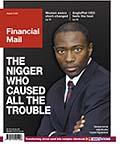That, at least, would seem to be a reasonable conclusion if Pelle Anderson is to be believed. Jonah Bloom, executive editor of Advertising Age, recently asked Anderson and three other designers to rethink how the New York Times ('the Grey Lady') coulld adapt to "the new consumer realities of the 21st century." Anderson made this point:
The core business idea of any newspaper (although the publishers and editors tend to avoid admitting to this) is to deliver a number of readers to the advertisers, or, more precisely, a certain exposure of the ads to a specific audience. The time the readers spend with the papers is the currency the newspapers sell to advertisers, and that time has been steadily diminishing since the '60s. What to do? To just go on producing what to a large extent is an increasingly irrelevant newspaper, like the New York Times does, is not a good idea.
The laws of the market apply to the New York Times as well, and species that don’t adapt will eventually perish. The future is coming, and it's coming fast.
If Anderson is right, then perhaps it could be argued that if those quaint notions about the public purpose of journalism have any use at all, it would be to keep pesky legislators at bay and to allow us to insist that (for the most part) we deserve free access to the raw materials of our enterprise (information)? Perhaps, too, the so-called 'Chinese Wall' that once divided newsrooms and their their public-service ambitions from advertising departments with their profit motives was simply a useful construct by owners and bonus-driven managers to keep a steady flow of talented idealists working long hours for low wages?
Or am I missing something?

